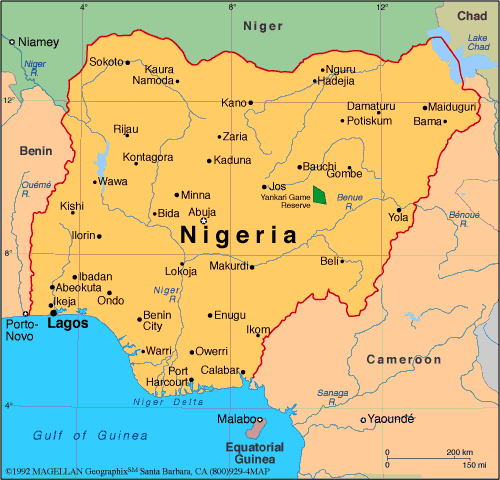Suspected jihadists kill seven, kidnap 22 in Nigeria

Nigeria map. INQUIRER FILES
KANO, Nigeria — Seven people have been killed and 22 others kidnapped in two separate attacks in northeast Nigeria’s Borno State where jihadist groups operate, security sources and residents said Saturday.
Insecurity is a major concern in Africa’s most populous nation as a new president is set to be sworn in this month following an election disputed by the opposition.
On Thursday, three farmers were killed and 11 others abducted by suspected Islamic State West Africa Province (ISWAP) jihadists near Bulayobe village close to the town of Banki, the sources said.
The farmers had ventured 10 kilometers (six miles) outside Banki to clear fields in preparation for the planting season, with the annual rains expected in days.
“Eight armed ISWAP men rode into the fields on four motorcycles and rounded up 14 farmers clearing the farms, taking them away,” said Usman Hamza, a militia leader fighting the insurgents alongside the military.
Article continues after this advertisement“Later, a search team recovered three of the farmers’ bodies with gunshots on them while the remaining 11 farmers are still missing,” Hamza said.
Article continues after this advertisementBanki resident Kabir Abdu gave the same account, saying his friend was among those killed while his brother was among the missing.
On Monday, 15 loggers went missing outside the town of Gamboru in an area where Boko Haram jihadists are active.
Four bodies were recovered in the bush the following day while the whereabouts of the remaining 11 remained unknown, said Umar Kachalla, an anti-jihadist militia member in Gamboru.
“We found four bodies but gave up on the other 11 after (an) extensive search,” Kachalla said. “We believe Boko Haram is holding them,” he said.
Gamboru resident Idris Halilu gave the same account.
Boko Haram and their rivals ISWAP often target loggers, herders, farmers, fishermen, and metal scrap collectors, accusing them of spying for the military and militias fighting them.
The attacks underline the continued risk civilians face in rural areas, more than 14 years since the insurgency began.
Despite this, local authorities have closed many camps for those internally displaced by the violence and are returning people home, arguing they should resume farming and rebuild their lives.
RELATED STORIES
Flights disrupted as Nigerian aviation workers strike over pay, conditions
Nigerian court orders killing of noisy cockerel